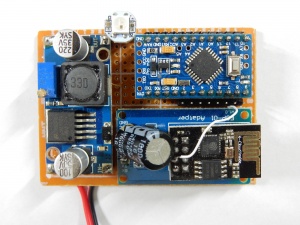IoT with AME: Difference between revisions
Jump to navigation
Jump to search
No edit summary |
No edit summary |
||
| (9 intermediate revisions by the same user not shown) | |||
| Line 3: | Line 3: | ||
[[File:20170802T115833.jpg|thumb|left|300px|Voltage controller (left), status LED (RGB; top), Arduino (top right), ESP8266 (bottom right, on adapter) - My standard hardware stack]] This is work in progress started in June 2017 - I am in the process of typing out my experiences with IoT, Arduino, and ESP8266, as a documentation for myself and as something that might be helpful to others. | [[File:20170802T115833.jpg|thumb|left|300px|Voltage controller (left), status LED (RGB; top), Arduino (top right), ESP8266 (bottom right, on adapter) - My standard hardware stack]] This is work in progress started in June 2017 - I am in the process of typing out my experiences with IoT, Arduino, and ESP8266, as a documentation for myself and as something that might be helpful to others. | ||
* [[The AME Stack]] - A compact software and hardware stack to build MQTT-connected IoT devices | |||
* [[My IoT projects]] - What I built over time (plenty!) | |||
* [[MQTT]] - A protocol for connecting IoT devices | * [[MQTT]] - A protocol for connecting IoT devices | ||
* [[ | * [[Software Stack|Software]]: Libraries for devices and capabilities, and access on MQTT-, TCP-, WLAN-, and chip level | ||
* [[ | * [[Software Problems]]: C++ and very small memory pose diverse challenges | ||
* [[ | * [[Hardware Stack|Hardware]]: Arduino, ESP8266, and additional hardware | ||
* [[ | * [[Hardware Problems]]: Bugs are not limited to software - plain electricity can be tricky, too! | ||
* [[Challenges]] - How to overcome hardware and software limitations | * [[Challenges]] - How to overcome hardware and software limitations | ||
* [[Management]] - How to manage an IoT installation | * [[IoT Management]] - How to manage an IoT installation | ||
* [[ | * [[To Do]] - What I would like to improve and add in this Wiki | ||
<br clear="all"/>Note to self (help on MediaWiki): | <br clear="all"/>Note to self (help on MediaWiki): | ||
Latest revision as of 22:19, 19 June 2018
IoT with AME - The Internet of Things, with Arduino, MQTT, and ESP8266
This is work in progress started in June 2017 - I am in the process of typing out my experiences with IoT, Arduino, and ESP8266, as a documentation for myself and as something that might be helpful to others.
- The AME Stack - A compact software and hardware stack to build MQTT-connected IoT devices
- My IoT projects - What I built over time (plenty!)
- MQTT - A protocol for connecting IoT devices
- Software: Libraries for devices and capabilities, and access on MQTT-, TCP-, WLAN-, and chip level
- Software Problems: C++ and very small memory pose diverse challenges
- Hardware: Arduino, ESP8266, and additional hardware
- Hardware Problems: Bugs are not limited to software - plain electricity can be tricky, too!
- Challenges - How to overcome hardware and software limitations
- IoT Management - How to manage an IoT installation
- To Do - What I would like to improve and add in this Wiki
Note to self (help on MediaWiki):
